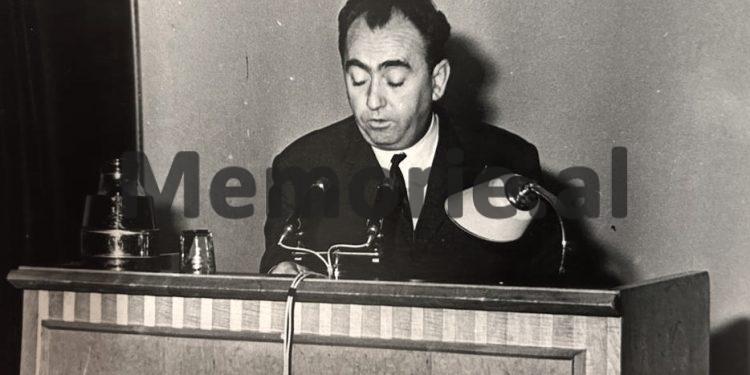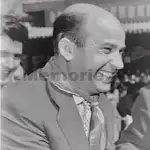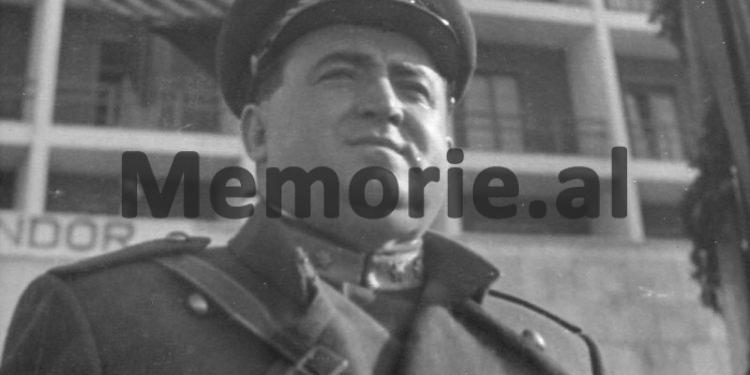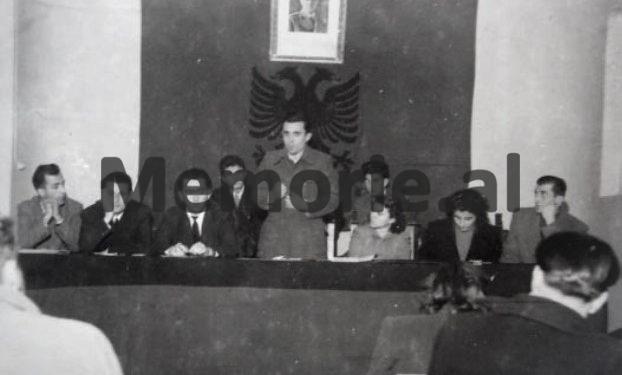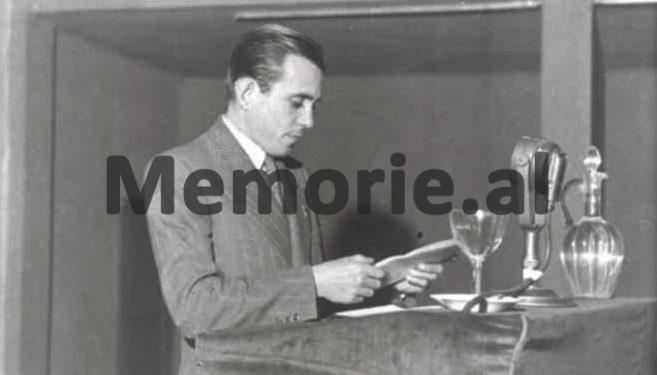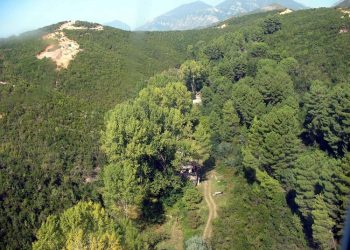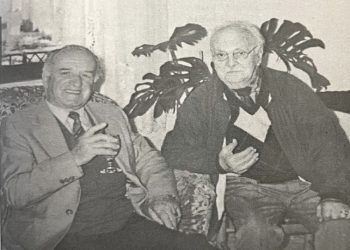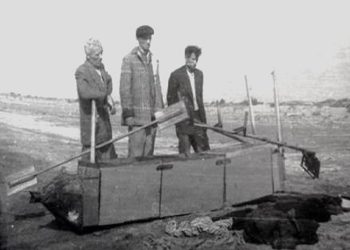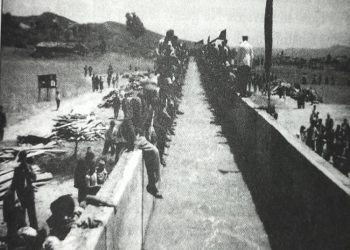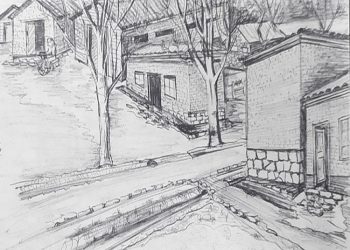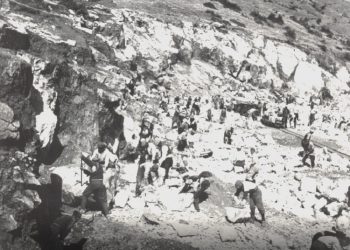By Fadil Paçrami
Part sixteen
Memorie.al / What is prison? It is the place where those who have been sentenced to deprivation of liberty are kept, we would say by reading any dictionary. But that is little. Prison and freedom – two opposites. Previously: what is freedom? In short: to be free means to do what you want, to think and act as you wish in the exercise and fulfillment of your freedoms and rights, as a person and as a citizen, but always without harming and violating others. . Again: to think and act. We are talking about democratic freedoms, from those of speech, press, assembly and organization in various parties and associations, ensuring the conditions where ideas, requests and human wills can find expression and concretization, from those of the biological-related plan with the being itself, to those of the social plan, related to the ways of living.
Continues from last issue
Returning to the issue of conservatism and liberalism, he does not hold back and unwittingly says some truths: “For Fadil Paçram, to conservatism in the old sense, as I say classically, is added the “new conservatism”, which according to him exists in the party So the line of our party, in his opinion, according to the facts said and done by Fadil Paçrami, is conservative and should be liberalized, modernized, liquidated and a new party created.”
What I could not say openly at that time, he says with his mouth, other than rejecting it by putting it in the mouth of an “enemy of the party”. In short, he felt it, saw it and was aware, as its inspirer and architect, that the Party’s line was conservative and sectarian. He also felt that this opinion was maturing and gaining ever wider reach in certain circles, especially intellectual ones, in those of the youth and in the heart of the Party itself. So, he felt the need to silence them, he threatened, made accusations and cursed, so that they would remember that otherwise they would suffer badly, the party would be merciless and would hit anyone hard, as it did in that plenum, the thread after it, and in the years that followed.
Another: “For the revisionists Fadil Paçrami and Todi Lubonja, the Albanian Labor Party was a bureaucratized party, a dogmatic, conservative Stalinist party. Therefore, their megalomaniac objective was to change its course. How? By fighting with the mask legal for the distortion of the line. Their anti-party and anti-proletarian concepts led them to choose the basis of the launch of their activity in culture and the arts, because they thought with the naivety of the reactionary that there would be the weak point of the party and favorable for them. They thought, also, that in their anti-party actions, they would find support in the youth, which, according to them, they would be able to oppose to the party”.
And if at that time, these things were said for those purposes as they were said, why not tell the truth today and out loud?! For this, I am also reminding them, so that what has not been done, will be done now. What’s stopping you? Maybe they were not seen at all then, many thought the same and kept them as they were, others out of fear – after all, who would dare to do otherwise…?! And today, why?! Still?! Until when?! The bad thing is, the gangrene is out in the open. It moves towards complete degeneration – catastrophe. How hard not to see this now. Or it is seen and pretended not to be. What prevents?! Beliefs?! I don’t think so… today’s developments and reality make you review and reevaluate them. Fear? Yes, he is no more! Complicity?! But this cannot be avoided. Why burden yourself further? The thought that it can still walk (or rather push)? But illusions don’t last long. What then? It’s time to think. Enver Hoxha did everything to tell her to stop the time…but she didn’t listen, she did her own thing. Screamed against her, talked a lot, accused, and cursed… still nothing.
He took oppressive measures, stretched and burdened him everywhere, but they did not give him anything. They turned to the opposite. It was and remains a dead end, with no escape. So the end will be nothing but tragic, as it seems best now. Stand firm: this was a tension full of anxiety, that a day might come, the end of which I had long feared. I’m not talking about death, but about the head of the pyramid, which held and had done everything for him, for the power and “glory” he so desired. It had happened several times before the danger, to lose them in Berat, from the end of ’44, later in the years ’47-’48, after the death of Stalin, until ’56, again in ’60 . But it was all over. The unexpected could come more from the outside.
The exit from the “Warsaw Treaty” gave him some guarantee and temporarily strengthened his positions. The danger reappeared in the early ’70s, with Beijing’s ping-pong policy, so it reacted so strongly in ’73 and after. From the inside, the forces that could endanger him have been weakened by one blow after another. It brings to mind: from the second half of the 50s, when in most countries of the East, the main leaders had fallen one after the other, Cervenkov was also removed in Bulgaria, a correspondent of the newspaper “Le Mond” of Paris, staying in Athens, he asked and was allowed to come to Tirana. At that time I was the president of the Union of Journalists and I hosted a dinner for him before he left. I asked him that; what were the impressions and what was he thinking of writing. “Mr. Paçrami, he told me, I have come to see if Enver Hoxha will be removed or not”. And what do you think, I asked him they have a hard time”. And that’s what happened. Likewise, in the 70s and early 80s.
The country was going through great difficulties and they were increasing. Foreign aid has been cut. We have been with them for a long time, now how would it be done? Even the team that supported him was no longer him. Stresses and neuroses started, as has been said. To those around him, where to rely, to whom should he leave his inheritance? He thought for a long time. He didn’t trust one; the other didn’t warm to him with his indecision, others…! He had always lived with mistrust, and more doubts, for those around him. As he himself affirms, he lay in wait for them and finally, hit anyone who raised suspicions or who gave signs of opposition. Thus, speaking at the end of the 4th Plenum, he stated quite openly, even for me and Todi: “In their every action, they were waiting for party ambushes”!
These: mistrust, suspicion, tracking and following step by step, hit time and time again, up to the highest levels, have become a way, a method and a tool, to rule and prolong the life at the head of the party and the state. Back, he couldn’t go back. To stop was just as risky. I drove on, squeezing the brakes even harder, that was all that was left. But everything has an end. And the end came. From God, as they say. But in its acceleration, events, developments, people have their weight. So there was that ending, as they like to say: terrible. Now, whatever happens, will it continue on that path or…?! A lot of water has flowed and the country is facing a real economic disaster, but also in other areas. The repressive measures had the opposite effect: violence peaked, but so did discontent then? There is only one way: To look at the past with a critical eye, even from oneself, as well as to show courage and wisdom to change direction.
3.
Now something more direct about Ramiz Ali and Manush Mufti, related to what I talked about above. Something would be missing, if I didn’t stay a little around them, since apart from the roles, in the negative sense as a whole, they are among the people, more aware, than any of the other leaders, than in the accusations against me, for; “high treason” and, “conspiracy”, there was nothing real. With Ramiz, as known for a long time, since we once worked together with the youth, after the 60s, he as secretary of the Central Committee, I as director of the Central Committee, for education, later also as secretary of the Party Committee of Tirana, in that field, until ’73. He wanted to work, to meet often and talk.
Many times, on certain issues, we have had different opinions, I have expressed them openly, he sometimes, not clearly, but neither like that, nor like that! Recently, we came to distance ourselves more. Face to face, I don’t remember him ever criticizing me, other than the cases when I was summoned by order and in the presence of others. But Enver Hoxha, in his speeches, at meetings of the Political Bureau, and elsewhere, says that he has spoken and reported me badly. “Comrade Ramiz told me that he also talked to you about your flaws and you recognized them.” (In the Political Bureau – June 16, 1965). When, about what, on what occasion did he talk to me? How and why did he report them?!
“It was said here that the agitation and propaganda did not go well. The criticism is right and I will not leave without mentioning the great responsibility of Fadil (Paçram), because he was directly responsible for this work in the Committee Central. His work has been flawed and for this he has been criticized several times” (At the Plenum of the Central Committee – July 13, 1966) what are these weaknesses and who criticized me – Ramizi?
“You have been called dozens of times by your friend Ramiz Alia, who thinks extremely rightly, about this issue.” And below: “Comrade Ramiz has always guided you correctly, for many problems…! Comrade Ramiz, he “ordered…”! (In the conversation with Enver Hoxha – March 30, 1973). What are these dozens of times and those instructions that he informed him about? Even about that issue of conservatism of liberalism and what is the main danger, it seems he reported as he wanted. Likewise for others. Here it turns out that he threw his indecisiveness and clumsiness, even his weaknesses, on me. That this was not the first time! In In 1947, when he was working with the youth – Liri Belishova, who was the first secretary, he was the second – she was severely punished, he came out clean?!
So even in the 1960s, that secretary of the Central Committee for propaganda, that director of the Central Committee, yes for propaganda, – she suffered again, he stood up and took her place. In ’73, he came out washed up again, threw everything he could at me, and Todi Lubonja. After that I don’t know, as before, because I was in prison. I’m not saying that he was telling the truth, at least then – in ’73, he didn’t do that, but why would he charge me with things that weren’t there?
Even Manush Mufti, the same. Regarding what was done in Tirana, from 1966 to 1973, it happened that we had different opinions, but if he did not give any opinion to be, that was all he knew and had no conviction his, I have the right to ask: when in 1973, that herd broke out before and after March 15, why did the defendant, for anything, say that I had only done it with my head? I can say that; he was never open with me. I will remember some cases:
When in the “Voice of the People’s” editorial office, completely contrived issues were raised against Todi Lubonja (at that time the editor-in-chief), he pretended to be sick and sent me to the base organization. Why did he do this, so that I would also fall into that trap and then be accused of “protecting and cooperating with Todd”, as happened later, since someone needed it, for material?
– When in the organization – base of the Directorate of Internal Affairs of Tirana, there was going to be a discussion about the removal of some cadres, related to some irregularities that had happened, and quarrels, he sent me back, because he was allegedly busy with another job. Purpose? He knows that. Apart from the investigator, I have been asked a lot: “What was wrong with me, why did I behave with such hatred towards the State Security”.
– When issues arose, regarding the change of some personnel in Radiotelevision, with the claim that; it would not be good for him to go, since his wife worked there, he sent me again, convinced that I would take the side of Todi Lubonja (at that time director of that institution) and that later, he was used in the accusations that they became my ground with the others. Someone, therefore, was interested in gathering facts and he contributed to this.
Why are they talking about all these and other things, which they are not saying? The conclusions emerge by themselves. The truth is that; be it Ramiz Alia, be it Manush Muftiu, they not only accused me as much as they could, they didn’t tell the truths they knew, for which they stood up and accused me, they participated in that conspired game before, during and after the year ‘73, but they threw as much as they could, enough to strengthen their positions, and even win others in the party hierarchy.
So, I didn’t do anything to their detriment, not even during the investigation, when I could have invented it, if I wanted to, even just to make it easier for myself. But I didn’t do it, I couldn’t do it. I thought I’d say, for everyone I listed above, I can’t keep them anymore; it’s time to get rid of them. And I’m closing with, as I started this letter: “Perhaps I will be called stupid. If to tell the truth, I wanted to be stupid, then – long live stupidity”!
Burrell, from 1987 to 1990
IN SEARCH OF UNKNOWN TRUTHS…!
(Notes from memories and those heard – discarded after prison).
They are arranged here, scraps from my memories, seen with a different eye today – closer to the truth; as well as from those who entered and spoke to the prison cells, from persons present and aware of the events, about which I will speak – always in search of unspoken truths. He added: in both cases, I will stick to some of them, what I called the most important.
The years 1947-’48
The truth is that in those years, there was a strong current in us, against the intervention of the Yugoslav danger, which threatened the independence of the country; against that policy of submission and capitulation, which was followed towards Belgrade. I was one of them. Below I will bring some of the cases where I happened to be present, I had to oppose them openly, I was criticized and my warning was removed, punishment measures were also taken. I will try to be as concise as possible.
– In May 1945, the II Congress of the Anti-Fascist Youth of Albania was held. The Yugoslav youth delegation, which had come on this occasion, openly provoked with the slogan; “Union-fraternity”, and other interventions. Since I met them so many times, they accused me of being anti-Yugoslav and it got to the point where a meeting was held at Enver Hoxha’s, where some of us youth participated, led by Nako Spiro, who were present. also Koci Xoxe, the Yugoslav ambassador V. Stoinič and the head of the Yugoslav youth delegation, a certain B. Perovic, in which I was severely criticized for opposing Albanian-Yugoslav friendship. In that meeting, it did not go any further, so it was as if it was closed, but it was not forgotten.
– That same year, when I returned from the Balkan Youth Congress, which was held in Belgrade, where I headed the delegation of our youth, another accusation came from there, that with my anti-Yugoslav attitudes, I had endangered the work of him and they scolded me again. The circle was getting tighter; from the youth levels, passed to the party ones. Their weight was felt now, more and more.
– In ’46, the Foreign Minister of Yugoslavia, a certain Simic, came to Tirana. At that time, I was the chairman of the Agjitprop Commission, next to the Central Committee of the party. Since in my absence, because I was outside of Tirana, by order of someone, the capital was filled with portraits of Tito and Yugoslav flags, which I called unfair, I went to Enver Hoxha and protested. Shtanga when he told me: “You have to understand that we cannot do without Yugoslavia, so this is how it will go.” There, even more questions were added to me.
– From June 1946, I started to participate in the meetings of the Political Bureau, of the Central Committee, as its candidate – this is what Enver Hoxha said then, a little later, in his book “Titiste”. says differently: “After the expansion we made to the Bureau, in the summer of 1946, they were not accepted as members, not even as candidates, but as three friends, next to the Bureau. These were: Liri Belishova, Mehmet Shehu and Fadil Paçrami”. So, it happened that I experienced some of the events of the time at the highest levels. Enver Hoxha says that Tuk Jakova, Hysni Kapo and Gogo Nushi were also members of the Bureau, but I don’t remember that they were present at the meetings. So did Mehmet Shehu, except when it was discussed about army issues, as chief of the General Staff, which he was.
I’m not arguing whether they were or not, but that’s how it happened. The meetings were held without any regularity, there were no fixed times and dates, except when we were notified, often at night, no agenda, no materials were distributed, as far as what was to be discussed, minutes were not kept, except for notes in some cases . They were held in Enver Hoxha’s house, around a quadrangular table, and it was like this: Enver Hoxha was at the head, from his right, on the long side, Koci Xoxe, Nako Spiro, Kristo Themelko and me, while on the other side, left- Bedri Spahiu, Pandi Kristo and Liri Belishova. In the two remaining empty places, = from the end, those who came invited and to report took place, according to the case. That there were also smaller meetings, separately, without calling some of the rest of us, this came out later.
The issues related to relations with the Yugoslav party and government was never discussed in the Bureau at that time, it seems they were discussed between Enver Hoxha and Koci Xoxe, except for two or three cases, which could not be avoided.
-From the spring of ’47, Belgrade further increased the pressure to turn Albania into a seventh republic of Yugoslavia. There was talk of drawing up a two-year economic plan and work was done on it, but it soon emerged that, under the guise of coordinating plans, Belgrade intended to integrate Albania into the Federation of Yugoslavia. The matter broke out from Nako Spiro, in a meeting of the Bureau that took place in the Palace of Brigades, and there a fight broke out between Nako Spiro and Koci Xoxes with calls, fists on the table and heavy words.
Among the idiocy of the claims and persistence of the Yugoslavs and Koci Xoxes, there was also the construction of a railway that would connect Albania with Yugoslavia and that would pass through the mountains, through the Drin valley, which was nothing but an adventure, to entered a unfinished business, and its opposition by Nako Spiro, was treated as a proof of anti-Yugoslav attitudes! Memorie.al
The next issue follows




